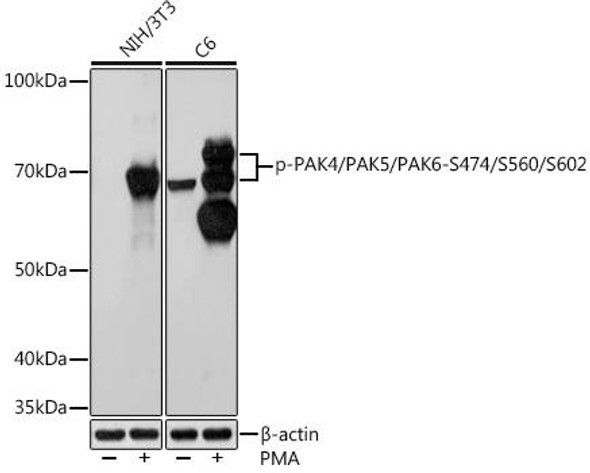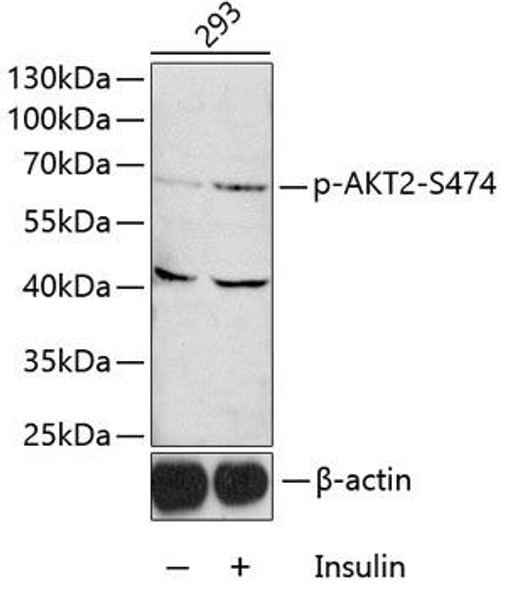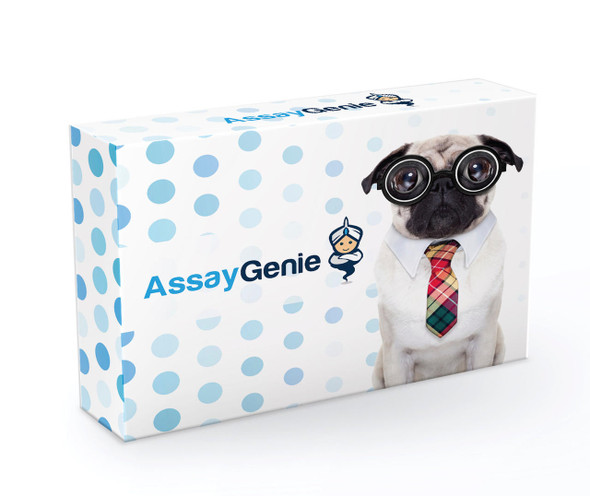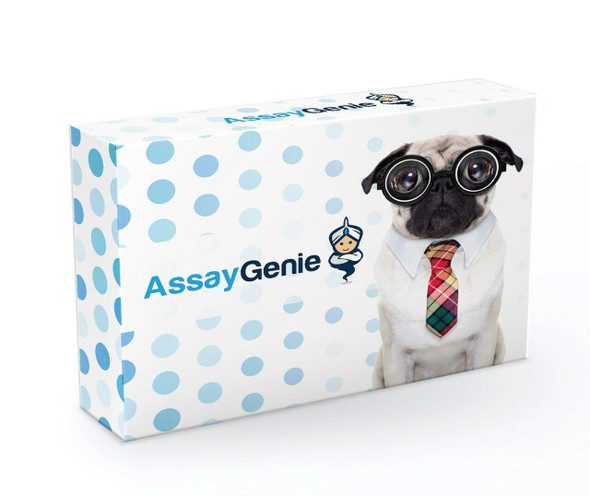Anti-Phospho-PAK4/PAK5/PAK6 (S474/S560/S602) Antibody (RACO0131)
- SKU:
- RACO0131
- Product Type:
- Recombinant Antibody
- Antibody Type:
- Monoclonal Antibody
- Reactivity:
- Human
- Host Species:
- Human
- Isotype:
- IgG
- Applications:
- WB
- IF
- ELISA
- Conjugation:
- Unconjugated
Description
Anti-Phospho-PAK4/PAK5/PAK6 (S474/S560/S602) Antibody (RACO0131)
The Phospho-PAK4/PAK5/PAK6 (S474/S560/S602) Recombinant Antibody (RAC0131) offered by AssayGenie is a valuable tool for researchers studying the PAK family of proteins. This antibody is highly specific and sensitive, capable of detecting phosphorylation at specific sites (S474/S560/S602) on PAK4, PAK5, and PAK6 proteins. The PAK family of proteins are key regulators of cell proliferation, migration, and survival, and dysregulation of their activity has been implicated in cancer and other diseases. By targeting the phosphorylation status of these proteins, researchers can gain insight into the signaling pathways involved in cancer progression and potentially identify novel therapeutic targets.
The recombinant antibody is validated for use in various applications, including Western blotting and immunofluorescence, and is suitable for use with human samples. Its high reactivity and specificity make it an ideal tool for researchers investigating the role of PAK4, PAK5, and PAK6 in cancer biology and other disease processes.
| Product Name: | Phospho-PAK4/PAK5/PAK6 (S474/S560/S602) Antibody |
| Product SKU: | RACO0131 |
| Size: | 50ul |
| Host Species: | Human |
| Tested Applications: | ELISA, WB, IF |
| Recommended Dilutions: | WB:1:500-1:5000, IF:1:20-1:200 |
| Species Reactivity: | Human |
| Immunogen: | A synthesized peptide derived from human Phospho-PAK4/PAK5/PAK6 (S474/S560/S602) |
| Form: | Liquid |
| Storage Buffer: | Rabbit IgG in phosphate buffered saline , pH 7.4, 150mM NaCl, 0.02% sodium azide and 50% glycerol. |
| Purification Method: | Affinity-chromatography |
| Clonality: | Monoclonal |
| Isotype: | Rabbit IgG |
| Conjugate: | Non-conjugated |
| Background: | Serine/threonine protein kinase that plays a role in a variety of different signaling pathways including cytoskeleton regulation, cell migration, growth, proliferation or cell survival. Activation by various effectors including growth factor receptors or active CDC42 and RAC1 results in a conformational change and a subsequent autophosphorylation on several serine and/or threonine residues. Phosphorylates and inactivates the protein phosphatase SSH1, leading to increased inhibitory phosphorylation of the actin binding/depolymerizing factor cofilin. Decreased cofilin activity may lead to stabilization of actin filaments. Phosphorylates LIMK1, a kinase that also inhibits the activity of cofilin. Phosphorylates integrin beta5/ITGB5 and thus regulates cell motility. Phosphorylates ARHGEF2 and activates the downstream target RHOA that plays a role in the regulation of assembly of focal adhesions and actin stress fibers. Stimulates cell survival by phosphorylating the BCL2 antagonist of cell death BAD. Alternatively, inhibits apoptosis by preventing caspase-8 binding to death domain receptors in a kinase independent manner. Plays a role in cell-cycle progression by controlling levels of the cell-cycle regulatory protein CDKN1A and by phosphorylating RAN. |
| Synonyms: | Serine/threonine-protein kinase PAK 4, p21-activated kinase 4, PAK-4, PAK4, KIAA1142 |
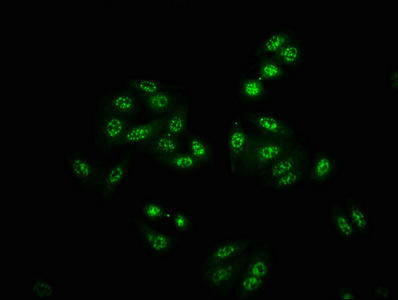 | Immunofluorescence staining of HepG2 cells (treated with 50mM Calyculin A for 30min) with RACO0131 at 1:100,counter-stained with DAPI. The cells were fixed in 4% formaldehyde, permeabilized using 0.2% Triton X-100 and blocked in 10% normal Goat Serum. The cells were then incubated with the antibody overnight at 4°C. The secondary antibody was Alexa Fluor 488-congugated AffiniPure Goat Anti-Rabbit IgG (H+L). |
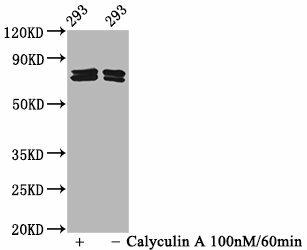 | Western Blot. Positive WB detected in 293 whole cell lysate treated with Calyculin A or not). All lanes Phospho-PAK4/PAK5/PAK6 antibody at 2.15µg/ml. Secondary. Goat polyclonal to rabbit IgG at 1:50000 dilution. Predicted band size: 64,75,80 KDa. Observed band size: 75,80 KDa. |
| UniProt Protein Function: | PAK4: a protein kinase of the STE20 family. A mediator of filopodia formation and may play a role in the reorganization of the actin cytoskeleton. Interacts specifically with the GTP-bound form of Cdc42 and weakly activates the JNK family of MAP kinases. Overexpressed in several cancers. Required for ras-dependent anchorage-independent growth of tumor cell lines. Four alternatively spliced human isoforms have been reported. |
| UniProt Protein Details: | Protein type:Kinase, protein; EC 2.7.11.1; Protein kinase, STE; Protein kinase, Ser/Thr (non-receptor); STE group; STE20 family; PAKB subfamily Chromosomal Location of Human Ortholog: 19q13.2 Cellular Component: focal adhesion; Golgi apparatus Molecular Function:protein binding; receptor signaling protein serine/threonine kinase activity Biological Process: apoptosis; cell growth; cell migration; cell motility; cell proliferation; cytoskeleton organization and biogenesis; mitotic cell cycle; signal transduction |
| NCBI Summary: | PAK proteins, a family of serine/threonine p21-activating kinases, include PAK1, PAK2, PAK3 and PAK4. PAK proteins are critical effectors that link Rho GTPases to cytoskeleton reorganization and nuclear signaling. They serve as targets for the small GTP binding proteins Cdc42 and Rac and have been implicated in a wide range of biological activities. PAK4 interacts specifically with the GTP-bound form of Cdc42Hs and weakly activates the JNK family of MAP kinases. PAK4 is a mediator of filopodia formation and may play a role in the reorganization of the actin cytoskeleton. Multiple alternatively spliced transcript variants encoding distinct isoforms have been found for this gene. [provided by RefSeq, Jul 2008] |
| UniProt Code: | O96013 |
| NCBI GenInfo Identifier: | 12585288 |
| NCBI Gene ID: | 10298 |
| NCBI Accession: | O96013.1 |
| UniProt Secondary Accession: | O96013,Q8N4E1, Q8NCH5, Q8NDE3, Q9BU33, Q9ULS8, B4DGG6 |
| UniProt Related Accession: | O96013 |
| Molecular Weight: | |
| NCBI Full Name: | Serine/threonine-protein kinase PAK 4 |
| NCBI Synonym Full Names: | p21 (RAC1) activated kinase 4 |
| NCBI Official Symbol: | PAK4 |
| NCBI Protein Information: | serine/threonine-protein kinase PAK 4 |
| UniProt Protein Name: | Serine/threonine-protein kinase PAK 4 |
| UniProt Synonym Protein Names: | p21-activated kinase 4; PAK-4 |
| Protein Family: | Serine/threonine-protein kinase |
| UniProt Gene Name: | PAK4 |
| UniProt Entry Name: | PAK4_HUMAN |





